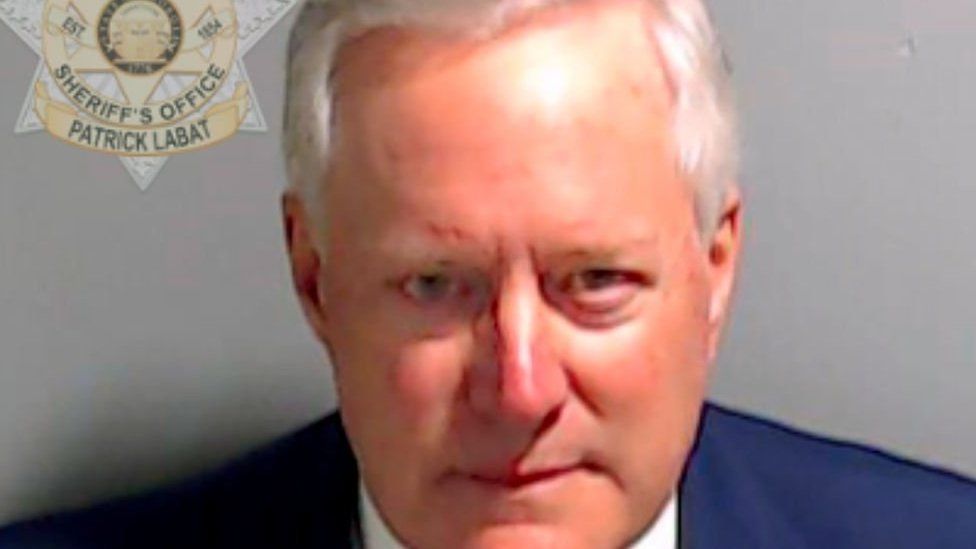ARTICLE AD BOX
 Image source, Handout
Image source, Handout
Former White House Chief of Staff Mark Meadows
A US judge has denied a request from Mark Meadows, a Trump aide charged in the Georgia election meddling probe, to move his case to a federal court.
Former US President Donald Trump and other co-defendants in the same case had hinted they might also try to move their cases out of Georgia state court.
But the latest ruling indicates any similar such legal manoeuvres may fail.
Mr Meadows is charged with Donald Trump and 17 others with a conspiracy to overturn Georgia's 2020 vote results.
Friday's ruling against the former White House chief of staff means the case by Fulton County, Georgia, prosecutors has survived its first major test.
All 19 defendants charged in Fulton County have pleaded not guilty. All of them, including Mr Trump, have surrendered at a Georgia jail to have their photos and fingerprints taken before being released on bail.
Mr Meadows is accused of arranging calls and meetings in which Mr Trump allegedly pressured state election officials to change the vote count in his favour. He is charged with racketeering and felony solicitation of violation of oath by public officer.
The former White House aide and his lawyers have argued that he was acting in his capacity as a federal employee, and therefore his case should be moved from state court to federal court.
But in a 49-page ruling on Friday afternoon, US District Judge Steve Jones in Atlanta wrote that the former top White House aide "has not met even the 'quite low' threshold" to have the case moved.
The evidence "establishes that the actions at the heart of the State's charges against Meadows were taken on behalf of the Trump campaign with an ultimate goal of affecting state election activities and procedures", wrote Judge Jones, an Obama appointee.
"Meadows himself testified that working for the Trump campaign would be outside the scope of a White House Chief of Staff."
The ruling adds that it "does not, at this time, have any effect on" similar challenges brought by the other defendants.
Image source, Getty Images
Image caption,Mark Meadows (right) at the White House in July 2020
Mr Meadows, a former North Carolina lawmaker, is expected to appeal the ruling, according to the Associated Press.
He testified before the federal court for three hours last week.
According to the Atlanta Journal Constitution, he told the court: "I don't know that I did anything that was outside my scope as chief of staff."
He added that he had "a very broad responsibility" to assure "accurate and fair elections".
Under a process known as "removal", defendants can argue that their cases should be tried in federal court if they were acting in their capacity as federal employees.
Watch: 'I think I made a responsible decision,' says Lindsey Graham
At least four other defendants - former justice department official Jeffrey Clark, Georgia lawmaker Shawn Still, former Georgia Republican chairman David Shafer and alleged "fake elector" Cathy Latham - have also filed for removal.
Fulton County District Attorney Fani Willis has said she wants to try all of the defendants together.
Mr Trump and his co-defendants may hope to find a more sympathetic jury pool in the federal court system. Fulton County, a suburb of Atlanta, is comprised of mostly Democratic voters.
Moving to federal court may also buy the lawyers representing Mr Meadows and other plaintiffs some time as they engage in more legal manoeuvres related to the switch.
Another potential bonus is that cameras aren't typically allowed in a federal court.
Earlier on Friday, Fulton County released a full report by the grand jury that initially recommended charges against Mr Trump and his 18 co-defendants.
The documents show that the panel recommended criminal charges against a total of 39 people.
The 20 people that Ms Willis elected not to pursue charges against include one current and two former US senators.

 1 year ago
33
1 year ago
33








 English (US) ·
English (US) ·